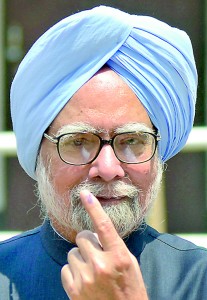Sunday Times 2
India’s Singh wasn’t king, Modi could be
Everything except the title of Sanjaya Baru’s “The Accidental Prime Minister” has invited controversy. And the title escaped opprobrium only because Manmohan Singh, who has never won an election, was the first to acknowledge that his elevation to India’s top political job was an accident of history.
The sycophants who surround Sonia Gandhi and her son Rahul are fulminating over this inside account of how the dynasty defanged the reformist Singh. They raise doubts about Singh’s former media adviser’s true motives: the memoirs appeared in the middle of a potentially regime-changing election.
But the timing is spot-on. Baru, an economist, journalist and currently a scholar at the International Institute for Strategic Studies, has given the chattering classes of Delhi a book to enliven their whiskey-soda evenings while a raucous poll rages outside: a five-yearly carnival for the country’s 814 million voters.
Beyond the gossip, though, Baru has written an authentic account of the systematic hollowing out of the Indian prime minister’s authority over the past 10 years. Sonia Gandhi, the hereditary Congress Party boss whose Italian birth kept her out of public office, wielded power without accountability. Singh, a first-rate technocrat handpicked by her as a placeholder until Rahul Gandhi was ready to rule, didn’t even get full control over the composition of his own cabinet.
This unbalanced power structure has been costly for India. Singh, who had ably steered India through a balance-of-payment crisis in the early 1990s as finance minister, watched helplessly as unsavoury ministers ran amok, dragging the government into one financial scandal after another.
Singh’s biggest achievement came in the first of his two five-year terms, when he signed a civilian nuclear deal with the United States amidst massive political opposition and only lukewarm support from Sonia Gandhi. His standing up to the bullying by the Left parties impressed people. Never a mass leader, Singh suddenly had a following.
“Singh is king,” thought Baru, as he suggested to the prime minister that he consolidate his new-found appeal by getting directly elected as a lawmaker in the 2009 general elections. But Singh was probably too shy to ask Gandhi to give him a safe seat. Anyway, she didn’t offer him one.

Prime Minister Manmohan Singh shows his ink-stained finger after casting his vote in the northeastern city of Guwahati on April 24. Reuters
It rapidly got worse. Baru reports that Gandhi appointed Pranab Mukherjee as finance minister in 2009 without even consulting Singh. Mukherjee’s tenure saw India rapidly lose credibility — both for its fiscal excesses as well as for its heavy-handed treatment of foreign investors.
It is then that the accidental prime minister should have realised that he would never be allowed to exert real authority. But he chose to stay on and squander people’s goodwill as the investment climate soured, GDP growth plummeted, the currency tanked and inflation zoomed. In Baru’s words, millions of Singh’s middle-class supporters feel “tragically cheated that he has allowed himself to become an object of such ridicule.”
While the book ends on this disappointing note, investors have reasons for optimism. Opposition leader Narendra Modi, the favourite to win the elections, is likely to swing the pendulum of power in the other direction. Not only will Modi not have a dynasty to appease, but the obstructive, old guard in his own Bharatiya Janata Party may have to consider retirement if the size of Modi’s election victory matches the hype of his campaign.
One of Modi’s first tasks will be to restore the glory of the prime minister’s office. He will most probably do that by a mix of centralisation and devolution.
Right now, the federal government is commonly conceived of as a collection of almost autonomous ministries and extra-constitutional institutions such as the National Advisory Council, through which Sonia Gandhi promoted her fiscally expensive, welfarist agenda. Modi is likely to concentrate more power in his own hands. He will then be better placed to attack the stifling red tape of India’s officialdom.
Conversely, the size of the federal government will have to shrink to allay criticism that Modi has dictatorial ambitions — a king he may well become, but people won’t accept an emperor. The 30 Indian states, some of which are as populous as Brazil, Mexico, Egypt or Turkey, will enjoy a bigger say in their own development plans and have more fiscal resources.
If the mix works, Modi will turn out to be the purposeful prime minister that Singh was kept from becoming.
(The author is a Reuters Breakingviews columnist. The opinions expressed are his own.)

